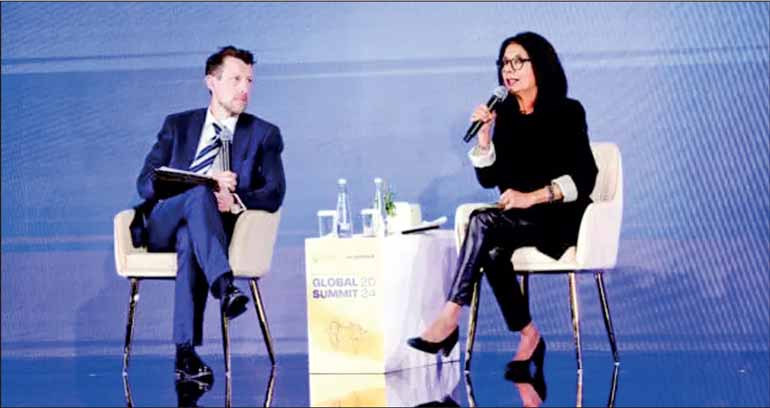Monday Feb 23, 2026
Monday Feb 23, 2026
Friday, 3 January 2025 00:22 - - {{hitsCtrl.values.hits}}


Dr. Najat Maalla M’jid in conversation with WeProtect Global Alliance Executive Director Iain Drennan
– Pic courtesy: WeProtect Global Alliance
 Dr. Najat Maalla M’jid, the United Nations Special Representative of the Secretary-General on Violence Against Children, recently highlighted a crucial, yet often overlooked issue: the psychological toll of online child sexual abuse (OCSA). Speaking at the Global Summit 2024 in Abu Dhabi, Dr. Maalla M’jid emphasised that while child protection efforts predominantly focus on physical safety and legal measures, the emotional and psychological consequences of online abuse are equally profound, often lingering long after the abuse itself.
Dr. Najat Maalla M’jid, the United Nations Special Representative of the Secretary-General on Violence Against Children, recently highlighted a crucial, yet often overlooked issue: the psychological toll of online child sexual abuse (OCSA). Speaking at the Global Summit 2024 in Abu Dhabi, Dr. Maalla M’jid emphasised that while child protection efforts predominantly focus on physical safety and legal measures, the emotional and psychological consequences of online abuse are equally profound, often lingering long after the abuse itself.
She called for a comprehensive approach that addresses both the prevention of harm and the mental health of survivors. This call for action challenges us to prioritise psychological support alongside protective measures.
Her remarks raised an essential question: Are we truly addressing the mental health impact of OCSA from a child rights perspective? How much of the ongoing discourse on online child protection is concerned with the psychological well-being of those who endure these traumatic experiences? This question led me to explore the broader psychological effects faced by victims of online abuse.
After the summit, I sought to explore this further and found myself drawn to the resources provided by Bravehearts, an Australian child protection organisation, which sheds light on the profound and lasting OCSA, particularly in terms of its psychological impact.
The psychological fallout of child sexual abuse
Bravehearts, provides a stark picture of the deep and long-lasting consequences that OCSA has on children, affecting them physically, psychologically, and behaviourally, both in the short and long term. The emotional and psychological scars often outlast the physical evidence of abuse, leaving lasting repercussions for a child’s development.
In the immediate aftermath of abuse, children may experience a range of physical symptoms—frequent illnesses, body aches, and difficulty concentrating. Their academic performance may suffer, and they may struggle to attend school regularly. Psychologically, children often endure mood swings, nightmares, and sleeping or eating disorders. Many experience profound shame and self-hatred, sometimes leading to self-harm or even suicidal thoughts. Regressive behaviours, such as bed-wetting or social withdrawal, are common, while others may act out sexually or emotionally as a way of coping with the trauma. These behaviours are just a few examples of how OCSA begins to alter a child’s perception of themselves and the world around them.
As time passes, the effects of abuse can become even more severe. Survivors may face lifelong mental health challenges such as post-traumatic stress disorder (PTSD), anxiety, and depression. The ability to form healthy, trusting relationships is often compromised, and many survivors struggle with identity issues, such as confusion about their self-worth or purpose. For some, unresolved trauma can lead to difficulties in parenting, substance abuse, or even criminal behaviour as they try to cope with their pain.
One of the most disturbing aspects of OCSA is the betrayal felt by victims, particularly when the perpetrator is someone they know and trust, such as a family member or close friend. This betrayal creates emotional scars that are even more difficult to heal, as the victim grapples with mistrust and feelings of profound loss.
The manipulation and grooming tactics employed by perpetrators play a significant role in shaping the victim’s psychological response. These tactics distort the child’s understanding of self-worth, making them more susceptible to ongoing psychological damage. The abuse often leaves the child feeling isolated, alienated, and unsure of how to reconcile their sense of self with the abuse they’ve endured.
The unique impact of online sexual abuse
When considering online sexual abuse, the psychological toll becomes even more complex. The digital nature of the abuse means the trauma is compounded by the permanence of abusive content, the anonymity of perpetrators, and the widespread reach of the internet. These factors make online sexual abuse uniquely damaging and far-reaching, affecting victims in ways that traditional forms of abuse do not.
Research by Schmidt, Varese, and Bucci (2023) offers important insights into the long-term effects of online sexual abuse. Their study reveals that many victims experience self-harm, anxiety, and low mood as a direct result of the abuse. Along with emotional pain, these victims struggle with their sense of self and interpersonal relationships. The ongoing trauma is exacerbated by the fear that their intimate images or videos, once shared online, may circulate indefinitely. The constant fear of exposure and the potential for re-victimisation contributes significantly to feelings of paranoia and vulnerability.
The grooming that often occurs in online abuse—where perpetrators manipulate children into thinking they are engaging in consensual activities—leaves victims with a profound sense of shame and self-blame. Many victims report that they did not initially recognise the abusive nature of their interactions, only understanding its severity years later. This delayed realisation complicates their emotional recovery.
Additionally, support services often fail to adequately address the unique aspects of online abuse. Although most victims seek help, the mental health support they receive is often insufficient or dismissive, failing to acknowledge the complexities of online abuse. Victims may feel that their trauma is not validated, further deepening their sense of isolation.
Bridging the gap: A child rights approach to mental health
The findings from researchers like Schmidt et al. (2023), Hanson (2017), and Joleby et al. (2020) make it clear that online sexual abuse should not be viewed as a less severe form of abuse when compared to offline abuse. In fact, the psychological consequences of online abuse can be even more profound, due to the permanence of digital content, the anonymity of perpetrators, and the far-reaching nature of the abuse.
For governments and international organisations working to combat child sexual abuse, it is imperative that mental health and psychological recovery be integrated into the conversation. Too often, the focus on legal protection and preventative measures overshadows the importance of mental health support for victims. Survivors of online abuse need targeted interventions, including access to therapy, counselling, and safe spaces where they can process their trauma.
Adopting a child rights approach means not only recognising the psychological harm caused by online abuse but also ensuring that resources for recovery are made available. Governments and international actors must prioritise mental well-being alongside safety and protection, ensuring that all children have access to the support they need to recover from the emotional and psychological damage caused by online sexual abuse.
A call to action for child rights and mental health
The psychological scars of OCSA are not just an afterthought; they are central to the trauma faced by children and can persist long after the abuse ends. Research makes it clear that, like offline abuse, the emotional and mental toll of online abuse must be treated with the same urgency and care. While physical safety and legal protections are critical, the mental health of victims must be treated as an integral aspect of child protection. Without addressing the psychological consequences, the cycle of trauma will continue, limiting the effectiveness of recovery efforts.
For governments, international organisations, and child protection agencies, the message is clear: we can no longer treat mental health as an afterthought when tackling child sexual abuse in the digital age. Mental well-being must be placed at the forefront of the global conversation about online child sexual abuse. This means adopting a rights-based approach to child protection that values psychological recovery alongside legal frameworks and preventative measures.
A crucial next step is to integrate mental health support into existing child protection programs. Survivors of OCSA need more than just legal safeguards; they require therapeutic interventions tailored to their unique experiences, particularly those that acknowledge the dynamics of online abuse. This includes access to specialised counselling, safe spaces for expression, and support networks that help children rebuild their self-worth and trust. Moreover, there is a pressing need for greater training for mental health professionals, educators, and child protection workers to better identify and address the psychological impacts of online abuse.
International frameworks like the UN Convention on the Rights of the Child must evolve to explicitly address mental health support for victims of online sexual abuse. Governments should ensure that mental health is not sidelined in the rush to create technological solutions or harsher penalties for offenders. The psychological needs of children must be integrated into policy discussions as much as concerns over online safety and prevention.
A collective responsibility
As Dr. Najat Maalla M’jid reminded us at the Global Summit, the fight against child sexual abuse must go beyond preventing harm—it must also address the psychological, emotional, and behavioural consequences of the abuse. The stakes are incredibly high. If we fail to address the mental health impact of online sexual abuse, we risk leaving survivors to carry their trauma in silence, burdened by feelings of shame, guilt, and isolation.
The time has come for a paradigm shift in how we approach child sexual abuse in the digital age. True protection involves not only preventing abuse but also ensuring that recovery, both psychological and emotional, is an integral part of child protection strategies. Mental health must no longer be an afterthought but a core component of child rights.
The challenge is clear: we must act now to ensure that every child who faces the tragedy of online sexual abuse is not only protected from harm but also empowered to heal. Governments, policymakers, child protection organisations, and mental health professionals must work together to create a world where children’s rights are safeguarded, and where the psychological well-being of every child is a top priority. Only then can we create a safer, more supportive environment for children, both online and offline.
(The writer is a media educator, trainer, and researcher specialising in the impact of digital media on the mental well-being of children and young people.)